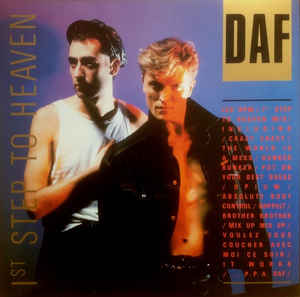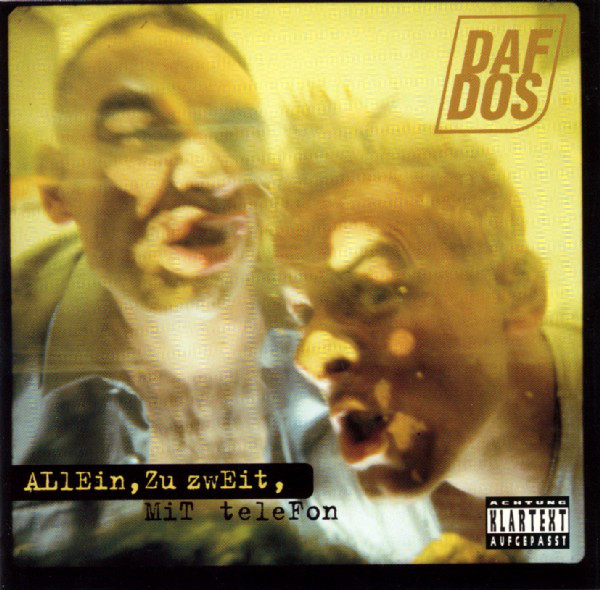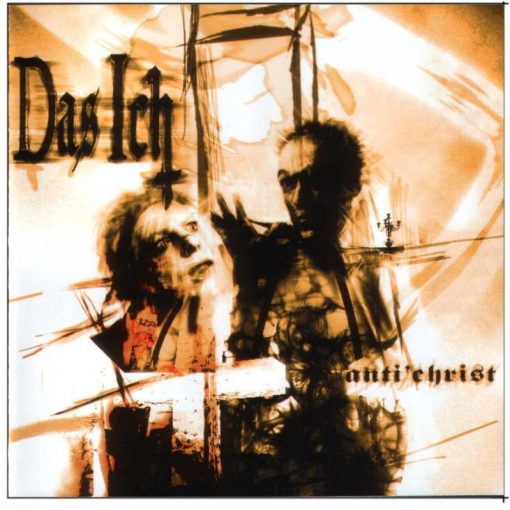Tanz
Both Robert and Gabi went their separate ways, each recording a solo album over the course of the next couple of years. Gabi also became to establish himself as a house DJ, an influence that would prove to be significant in 1985 when he re-united with Robert as DAF to record 1st Step To Heaven. Our favourite duo are on the cover and it’s still officially a DAF record in name, but that’s where the similarity with everything we’ve covered so far ends. This is dance music. DAF have gone disco.
It’s not like other bands with industrial scene connection haven’t pulled the same stunt. Psychic TV went acid house for a while, and Cabaret Voltaire spent the second half of the 80s shedding their industrial credentials in the pursuit of dancefloor smashes of their own. Indeed, the better parts of this album resemble those groovy-yet-still-slightly-edgy Cabs recordings, only without Mallinder’s vocal creativity. Gabi has started singing in English, and when It’s his third language at best, lyrical creativity is thin on the ground. Whilst previous recordings have hinted at carnal lust on several occasions, he now simply resorts to saying the word “Sex” far too many times.
There are occasions when they hit upon something vaguely worthwhile. Absolute Body Control (not to be confused with “Absolute Körperkontrolle” from ‘Gold und Liebe’) is the most successful at combining the smooth groove of their new sound with the raw impact of their early work. 1st Step To Heaven has a distinct atmosphere due to its use of a Middle Eastern scale, whilst Brothers is the only notable track lyrically. It speaks of the connection between Gabi and Robert – despite their on-off relationship as musicians, it seems there is a deeper bond between them that survived the years when they were not working together.
Unfortunately, these are fleeting moments on an otherwise unexceptional album of mid-80s house music. I’m not expert in the field of mainstream dance culture, but it strikes me that if it wasn’t for the DAF name, this recording would have gone unnoticed. Indeed, there’s a fair proportion of DAF fans out there that don’t even know that this thing exists.
Singles and Versions: The album got LP, cassette and CD issues, all long deleted and all with annoyingly different track listings, with the LP omitting “Absolute Body Control”. To confuse things further, a reordered US version of the album was issued in 1989 under the name ‘Hitz Blitz’. It looks like a DAF Best-Of at first glance – it isn’t.
Being a dance album, there were no less than five singles lifted from it in both 7” and 12” forms and sometimes with multiple versions with different remixes on each. As the underlying songs aren’t exceptionally strong, only a completist would want to track them all down. The strongest of the five is “Absolute Body Control”, which you’ll want anyway if you’re collecting the vinyl versions, not being on the LP version of the album. The two remixes are robust if unadventurous, but there’s an instrumental version of “1st Step to Heaven” on some versions, the Arabic scale working better without the rather insipid vocal.
Gabi and Robert went back to their solo careers after this. I’m not covering these here (maybe one day), but in order to at least partially plug a substantial gap in the timeline, I will cover DAF/DOS. This is not, as the name may suggest, the operating system for the onboard computers of heavy goods vehicles, but a Germanospanish hybrid title translating to ‘DAF 2’. Whilst Robert was busy discovering his inner Buddhist and recording solo techno albums, Gabi hooked up with Wotan Wilke and made another attempt to recapture some past glories.
The result was the awkwardly titled album Allein, Zu Zweit, Mit Telefon with an equally awkwardly timed release in 1996. Awkward, because this album is essentially a rave record released several years after the Second Summer of Love came to a close. Those cheesy synth lines, gimmicky hooks and cliché drum loops – it’s a style that produced many a hit 12”, but few full-length albums of note. And thiscertainly isn’t one of the notable ones.
The lead song is Ich glaub ich fick dich später – translating as “I think I’ll fuck you later”, it’s both the catchiest tune on the album and the most obvious sign that the integrity of the DAF name has been left for dead – Gabi would regularly allude to sexual desires in previous works, but always as an undercurrent. On ‘1st Step to Heaven’, the switch to English stripped out much of that subtlety. Despite a return to German lyrics, he’s just coming straight out with it now. There’s even a track called Mutterficker, and I don’t think I need to provide any further translation of that.
Indeed, as the albums continues, it’s clear that Gabi is putting little of his true self into these recordings – for the balance of the album, he wavers between ‘inaudible’ and ‘inconsequential’. Only on the furious techno blasts of Zurück nach Marzahn and Greif nach den Sternen does he really come forward and belt it out like the good old days. Taken as a standalone project, it’s a tolerable exercise in the generation of DJ fodder for the original glowstick-wavers (go home, futurepop!), but unnecessary in a genre that had already moved on.
Singles and Versions: The original album was released only on CD and was never reissued, though it’s relatively unimportant status means it’s quite easy to track down anyway. The only single was ‘Ich glaub ich fick dich später’, issued on 12” and CD single, with some versions issued with the more polite title “Stimme des Herzens”. The obligatory radio edit adds an additional bleep to a mix already loaded full of the things, plus an lengthy Club Extrem mix optimised for those beatmatchers who have all the mixing skills and none of the good taste.
Gabi and Wotan returned three years later with Der DAF/DOS Staat. Dumping the worst excesses rave trickery in favour of more clinical techno, it was at least successful in not sounding hopelessly dated on release day. Admittedly, they are just pulling the old Kraftwerk stratagem of producing sounds sufficiently abstract that they can’t be immediately placed at a specific point in music history. Indeed, many of the albums themes are lifted from earlier techno recordings by others, though this was not an unknown practice in the sample heavy 1990s. Meanwhile, even my basic German knowledge can identify that this album is still disappointingly lightweight in a lyrical sense. But we’ll take whatever positives we can at this stage.
The real upside of this approach is that when do hit upon a decent hook, it actually counts for something. The square wave burbles of Wegen Dir and the spell-out-the-band-name lyricism of Internationales Lied hit the sweet spot between catchy-but-throwaway dancefloor cheese and technically-good-but-dull beat science. If you’re only here for the ‘angry’ tunes, the acid breakbeats of Ringmodulator are as close as you’ll get. As for Oversexed Discoteque – it is indeed disco of the oversexed variety, the sound of electroclash coming in its pants three years ahead of schedule. Taking of which….
Singles and Versions: In true late 90s style, the album was only issued on CD, with some versions adding the also-available-separately single ‘International Song’. The single offers three slightly divergent takes, including the obligatory club-length version, which would work well in the Kraftier tech-beat style sets. There’s also a non-album instrumental “10 Metal Sequencer Music”, of interest to followers of high-speed Roland 303 acid, but perhaps not the DAF purists who have probably skipped over this part of the article anyway.





